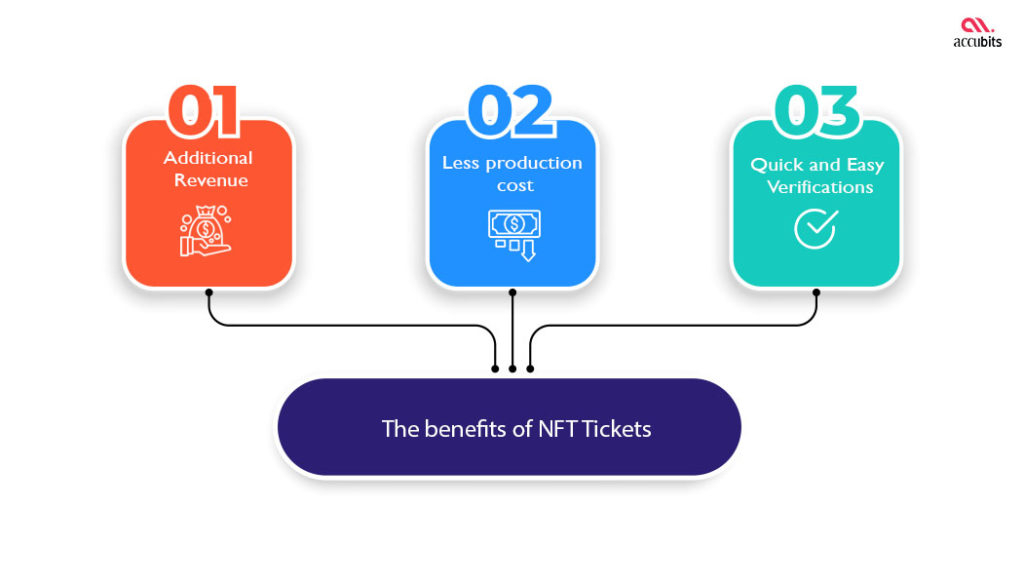
NFTs have changed our perception of ownership. Since its inception a few years back, the new tech has entered multiple industries with many new and innovative use cases. The events sector has also found a creative application of NFT in tickets and they are catching popularity worldwide. If you are a stakeholder of an events company, you should know how to create NFT tickets and change the dynamics of ticket issuance.
The world’s first NFT flight ticket was recently auctioned and sold at $1 million. That’s a whopping big number. You may wonder what the big deal is about. Let’s figure it out step by step.
- What is an NFT Ticket?
- How do NFT tickets work?
- What challenges does NFT ticktes solve?
- The benefits of NFT Tickets
- How to create NFT tickets
- Bottom line
What is an NFT ticket?
NFT tickets are digital tickets issued as a non-fungible token in a blockchain network. Non-Fungible Tokens or NFTs are crypto tokens that are unique. Each NFT token will have a unique identification code and metadata that distinguishes it from other NFT tokens.
Issuing tickets as NFTs or tokenizing them removes mediators who seek profit from the resale of the tickets for live events and concerts. Here blockchain technology is used to provide a solution to deliver digital tickets safely so that the event attendees can have a digital ticket with special offers and updates.
People can use these digital assets to generate additional income as these can be resold and owned as digital collectible assets. If you are not sure about non-fungible tokens, you can refer to this article – what is an nft?
How do NFT tickets work?
The ticket issuing agency can tokenize using an NFT minting smart contract. Each minted ticket would be unique. The tickets can be pre-minted or minted in real-time as users purchase the tickets. The minted tickets will have the details of the owner of the ticket and purchase details. The best part is that one can easily verify the authenticity of tickets’ in the blockchain network. And that for sure eliminates the game of fake tickets. Moreover, it is also easy to verify the ownership details of issued tickets.
The purchase amount is transferred to the issuer’s account when a ticket is sold. And the ticket can be programmed to be resold based on defined conditions. For example, the issuer can write the smart contract such that 25% of every subsequent transaction fee is sent to the issuer’s wallet as the tickets are resold in the secondary markets.
Related article: Applications of NFTs in Digital Entertainment
What challenges do NFT tickets solve?
1. Black market of tickets
The ticketing industry always creates a black market where people illegally purchase tickets in secondary markets for a higher price. This practice causes financial losses and security issues for the event organizers. This misuse of tickets has created a lot of chaos, leading to purchasing bulk tickets and then selling them off in secondary markets at higher prices.
2. No exchange protocol
The lack of exchange protocol leaves the owner of the tickets with no option, as it often leads to fraud in the market. When tickets are resold in the secondary market, the ticket no longer belongs to the ticket holder or the event organizer.
3. Lack of trust
There is often a loss of trust as the buyers won’t know whether they have purchased a real ticket or a fake one, especially when buying it online or from resellers. They are leading to disappointment and creating trust issues.
The benefits of NFT Tickets
NFTs are changing the future of the ticketing industry and provide many benefits for both the buyers and the organizers.
 Additional Revenue
Additional Revenue
The programmable nature of NFTs helps the organizers calculate the profit percentage of the tickets and think of its future resale in secondary markets as these tickets are unalterable. Every time the ticket is resold, the issuer gets a cut. The resale of tokenized tickets as collectibles, rewarding fans who have collected more event tickets, providing perks to tickets sold at the highest price, etc., can be used as recurring programmable money, creating more revenue opportunities.
Less production cost
Issuing tickets as NFTs is cheap. Buyers can validate the ticket’s authenticity by tracking its history of transactions and ownership. Minting NFT tickets into the blockchain is essentially creating a new block in the blockchain network and recording the information in it for the purpose of validating, and companies can do it at a less cost.
Quick and Easy Verifications
NFTs are known for their authenticity. Blockchain technology can be used as a trusted source for both the buyers and the organizers. It is easy to the ticket’s authenticity as it contains all the data from the initial sale to the final owner. It can be developed as a non-transferable ticket that cannot be transferred from one buyer to another, preventing fake tickets and scams. The tickets can be minted in a few seconds and made available as NFTs to the buyers on-demand at their required time.
Benefits of NFT tickets for buyers
- An opportunity to become a part of the event community and avail exclusive perks
- Long-term benefits of collecting memorable tickets just like vintage tickets
- Opportunities to receive exclusive perks and offers to frequent ticket buyers
- Guests can resell it to buyers who love ticket collections.
NFT ticketing benefits for organizers
- Creation of artistic NFT tickets created around the story and brand of the event, which can attract ticket collectors.
- They are authentic, making them less susceptible to scams and frauds.
- Rewards and perks can be earned when tickets are sold further in the secondary market.
- Easy distribution of tickets through online sources.
- Access to valuable data to make future events better and well-informed.
- Additional revenue.
Related article: Top 10 Doubts And Questions On NFTs Answered
How to create NFT tickets?
NFT tickets are digital assets that can provide incentives and unique perks for your events to generate revenue streams for yourself and your community. Below are the steps to get started with NFT ticketing.
- Event organizers can select the blockchain where they would like to tokenize their tickets. Choosing a Proof-of-stake blockchain can save you minting costs and operational expenses.
- The next step is to program the smart ticket contract. The smart contract can define the rules for sale price, auction rules, resale rules, royalty fees, etc.
- The next step is to link an IPFS system to the ticketing system so that the users who purchase the tickets can get a digital file of the ticket. Possibly with a QR code that can help the event organizers to verify the ticket authenticity.
Bottom line
Every industry and brand is looking up to NFTs to tap into the global audience, and NFTs have established themselves as a major marketing segment in the event industry. NFT ticketing has reassured the buyers about the transparency of the tickets and the ownership of the NFTs. With the NFT-based tickets, the revenue opportunities are endless, and now with the advent of Metaverse, it will aptly complement the NFT ticketing. The benefits of NFT ticketing are numerous, and it is upon us to leverage its benefits and keep an eye on its potential opportunities.
Related article: Where will NFTs pop up next?


